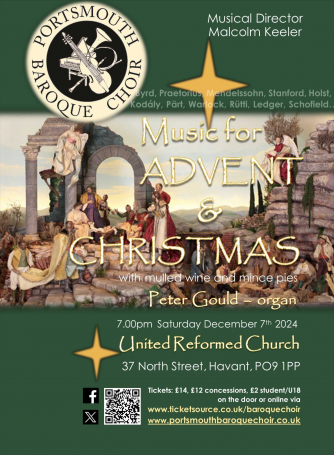Details
Havant and Emsworth URC Church
37 North Street
Havant
Hampshire
PO9 1PP
England
Programme
William Byrd – Laetentur coeli
Anonymous – Rejoice in the Lord Alway
Michael Praetorius – Es ist ein Ros entsprungen
Gustav Holst – Lullay My Liking, Op.34 no.2
Ian Schofield – There is no rose
Giovanni Pierluigi da Palestrina – Fuit homo missus a Deo
Felix Mendelssohn – St Paul, Op.36: How lovely are the messengers
Gustav Holst – Long ago, prophets knew
Charles Villiers Stanford – Benedictus in C
~ Interval ~
Zoltán Kodály – Veni, veni Emmanuel
Philip Ledger – Adam lay ybounden
Carl Rütti – I wonder as I wander
Arvo Pärt – Bogoroditse Devo
Gustav Holst – This have I done for my true love, Op.34 no.1
John Merrick – The Bee Carol
Peter Warlock – Benedicamus Domino
Ian Schofield – Benedicamus domino
Performers
Peter Gould – chamber organ
Malcolm Keeler – Conductor
Portsmouth Baroque Choir
Programme Note
How lovely are the messengers that preach us the gospel of peace. To all the nations is gone forth the sound of their words… are transcendental lines from Epistle to the Romans that hold the key to our programme of Music for Advent and Christmas, combining messages about the Second Coming and celebration.
Those “messengers” were Paul and Barnabas who travelled together ca. 46-49 CE evangelising and making converts. Mendelssohn included that text in the second part of his oratorio St Paul (1836) since when How lovely are the messengers has become well-known and loved by church choirs as a standalone anthem.
The Mendelssohn sits about halfway along the line of 430 festive seasons separating the earliest from the most recently-written music included in our programme. The Second Coming message is beautifully expressed in William Byrd’s ‘Laetantur Coeli’ (1589) that begins our concert. At the other end of our chronology, John Merrick’s setting of Carol Ann Duffy’s The Bee Carol (winner of the 2018 BBC Radio 3 Carol competition) makes a connection between the winter behaviour of bees (messengers of a kind) as they cluster around the queen that will sustain their existence, and the “trembling” light from stars that announced the holy birth.
Drawing on the music of several nations, from England we celebrate the 150th anniversary of the birth of Gustav Holst with his arrangement Long ago, prophets knew, to a tune from Pie Cantiones (1592) and the carol Lullay my Liking. From Central and Eastern Europe we have Kodály’s popular arrangement of ‘O come, o come, Emmanuel’ (1943), Arvo Pärt’s swiftly rhythmic, King’s College commission Bogoroditsye Dyevo (1990) and the traditional Appalachian carol I wonder as I wander by Swiss composer Carl Rütti.
Closer to home, we are delighted to conclude with music by the choir’s President Ian Schofield. He wrote Benedicamus Domino, a sequence of three carols, for Portsmouth Choral Union in 1997.
The remainder of the programme draws on the 1999 Anthology Advent for Choirs, including Philip Ledger’s Adam lay ybounden, Stanford’s Benedictus in C and the anonymous 16th century anthem Rejoice in the Lord alway.
The United Reformed Church in Havant has a warm and friendly interior with fine acoustics: with mulled wine and mince pies in the interval, and some audience participation in the music, this will be the perfect way to progress your festive season.

 Your events at Classical Events
Your events at Classical Events

